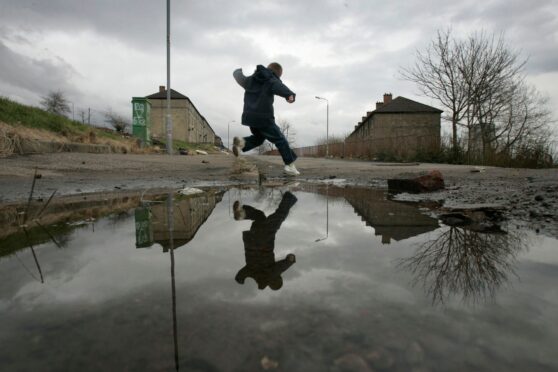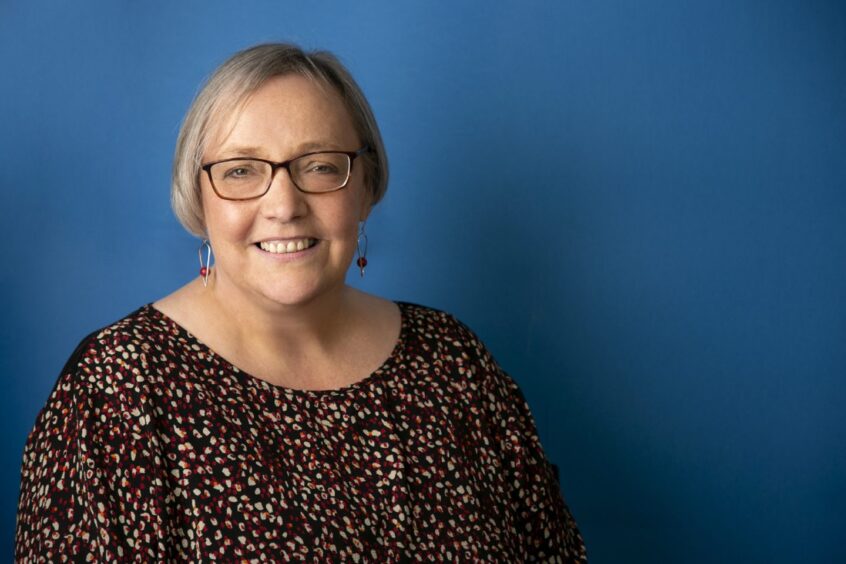
Poverty is inflicting an increasing toll of stress, anxiety and depression on 240,000 Scottish children growing up in the poorest postcodes, experts warn today.
The escalating crisis has been exposed as leading children’s charities fear some of Scotland’s most vulnerable children and their families have not been heard in the general election campaign.
An estimated one in six Scots children and adolescents now need specialist mental health support and experts fear those from poorer households are at particular and increasing risk as the cost of living outstrips wages and benefits.
Children growing up in poverty are five times more likely to be unhappy than those from better-off homes, according to research, and four times more likely to develop serious mental health problems.
Dr Laura Sutherland, of the child and adolescent mental health faculty of the Royal College of Psychiatrists in Scotland, suggests the link between poverty and mental health issues is strong and undeniable.
She said: “World Health Organisation research suggests more than half of all health outcomes are linked to social determinants, things like income, unemployment, job security, food insecurity and housing.
“Those factors have a huge impact on children’s mental health and most are related to poverty.
“We know that children living in households with income in the bottom 20% are up to four times more likely to have serious mental health difficulties compared to those in the top 20%.
“We see an increase among those children in behavioural disorders, such as attention deficit and conduct disorders and we see that emotional disorders, like depression, low mood and anxiety, are also more common in poorer families.”
She said children in households struggling financially will see and share in the stress of their parents, who often are also suffering poor mental health.
Sutherland said: “There are a multitude of reasons why poverty is linked to poorer mental health outcomes.
“In children and adolescent mental health services, we ask about the family’s financial situation because it is a recognised risk factor.
“If parents are anxious and stressed that can have an impact on a child’s mental health.”
Child poverty and mental health links
The link between child poverty and mental health issues, ranging from stress and anxiety to depression and self-harm, is driven by many factors but can leave an enduring legacy of mental ill health.
The Royal College of Psychiatrists in Scotland is calling for party leaders to promise that 1% of NHS budgets will be spent on services supporting children with mental health problems.
Sutherland added: “There are clearly factors at play in poorer households that are not an issue in more financially secure households.”
Scotland’s schools are a place of refuge for many children trapped in poverty, according to teachers, but many of the services supporting them have been stripped by local authorities to make savings.
Angela Glassford, a former primary headteacher in Paisley’s Ferguslie Park, which has some of Scotland’s worst levels of deprivation, fears the situation is worsening as families become trapped in generational poverty.
She said: “One of the most dispiriting things is that we know the answer. We know what works and we’ve seen it working but we’re just not doing it.
“Investment in financial support for families is clearly part of it but so are all the ways we can help ease pressure on these children and offer them a safe space with trusted, encouraging adults.
“At the top of the pyramid, there must be specialist mental health care available but, below that, there are so many children who only need responsive, supportive adults around them.
“The schools and third sector organisations delivering that kind of support know it works and know it prevents problems getting worse but the funding comes and goes, projects start to deliver before being suddenly closed or cut back. They might not be core services, like teachers in front of a class, but they are the very opposite of luxury services.”
‘They have nothing to look forward to’
Glassford, who now works in the voluntary sector, said the day-to-day strain of living in households where one small but unexpected bill can topple families into financial catastrophe affects pupils in different ways.
She said: “Some become really withdrawn and unable to participate or get the most out of things.
“At the other end, kids will be acting out because they are just buzzing with stress and on high alert all the time.”
Poverty takes a toll on young lives, she said, but so too do the many other social issues that can come with it, from domestic violence and alcohol abuse to poorer levels of mental and physical health.
She said: “Many of these children are also likely to have carer responsibilities for a parent or a sibling.
“They are living at chronic stress levels and the pressure of their daily lives leaves no space for themselves to learn, develop or have fun. They have nothing to look forward to, holidays, days out, or any of the other positive, enriching experiences other children enjoy and enjoy anticipating.
“All their resource and energy is being taken up with worry about their parents and how much money there is at home.”
Shocking survey exposes ‘devastating’ poverty as young Scottish families forced into destitution
The leading children’s charity, Aberlour, which delivers specialist support to vulnerable young Scots and their families, fears an enduring cost of living crisis is taking a toll on a rising number of young Scots.
The charity staged a special hustings last week when young people quizzed the main parties on their plans to combat child poverty at the Science Centre in Glasgow.
Chief executive SallyAnn Kelly is disappointed that the need for effective action to ease child poverty has not been a bigger issue during the campaign.
She said: “Poverty can damage children and their families in a million different ways. Without political will and proper resources, many of those young Scots will lose their chance for happiness today and a better life tomorrow.”
Every party has pledged to help… but talk is cheap
By SallyAnn Kelly, chief executive of Aberlour children’s charity
They will not have a vote in this election and their voice has been drowned out in the clamour of campaigning.
The 240,000 Scots children locked in poverty deserve to be heard, however, and the action needed to ease their lives and secure their future should run like a seam through every manifesto.
Every party leader has promised action to reduce the impact of poverty on so many children growing up in our wealthy country. Of course they have, but who wouldn’t? Words are cheap – even cheaper during an election campaign – and only effective, committed and properly resourced action will make that difference.
One in four young Scots live in poverty, proportionately far more than working-age adults or pensioners, and it is hard to think of a more urgent, important issue in this general election than improving their lives and futures. It is both a national emergency and a national disgrace that there are 4.3 million UK youngsters – austerity’s children, in the phrase of former prime minister Gordon Brown – now living in poverty. The figures are bleak enough but still, almost certainly, underestimate how many are suffering today while poverty corrodes their future chances.
The Child Payment in Scotland is helping and the proportion of children living in poverty here is lower than elsewhere in the UK but that is no comfort when 24% of our children remain poor, when so many are going to school hungry and returning to cold homes.
Certainly, there is no sign of the attainment gap closing between schools in our wealthiest postcodes and the poorest.
There is hope, however, and action to be taken and priorities addressed. The two-child benefit cap must go; the obscenity of children being in debt for school meals must end; a debt amnesty for low-income families should be implemented; and support for unaccompanied asylum-seeking children improved.
Scotland and the rest of the UK must halt the slow-motion tragedy of children’s lives being blighted and their futures sabotaged by grinding, debilitating poverty.
Seven out of ten of poor children live in working families compelled to rely on food banks and benefits while the safety nets of a civilised society fray and tear. Aberlour and the many other charities and organisations working tirelessly to support and protect vulnerable children and their families are busier than ever. Political leaders must ensure that, by the time the UK votes again, we won’t be.

Enjoy the convenience of having The Sunday Post delivered as a digital ePaper straight to your smartphone, tablet or computer.
Subscribe for only £5.49 a month and enjoy all the benefits of the printed paper as a digital replica.
Subscribe © Supplied
© Supplied